Teen violence is recurring at an alarming pace worldwide. India too is becoming a victim to such a disturbing trend. Psychiatrists counsel sufficient family and community support.

Realising that he hailed from an affluent family, the youngsters set up a “female trap” – they promised to introduce him to a girl named Angel, their own online creation. Adnan left his home after informing his parents that he was going out to meet his Orkut friends. Later, his body was found in an abandoned car.
A little later four boys in rural Delhi beat up a classmate to death over a petty quarrel.
Two months ago, a 14-year old boy Mahendran was killed in Salem district in the south Indian State of Tamil Nadu when his classmate dashed his head against a wall for refusing to lend a pen.
In that horrid incident in Bihar only a couple of days ago when ten persons were beaten to death, many of those seen bashing up the victims were in their prime of youth. One can easily imagine how those close to the victims would become brutalized in turn.
Elsewhere, the world was repulsed to watch a video released by pro-Taliban militant group in Afghanistan which showed a teenager beheading a paramilitary soldier who was kidnapped in South Waziristan in Pakistan.
“One must remember that a child not only learns the mother tongue from parents but also imbibes their behaviour. If the parental model is not one that is built on the strength of love and care and the child imbibes aggression. After all, the child is led to believe that aggression is a language with which you can get what you want. Obviously, violence breeds violence,” explains Dr R Sathianathen, professor of Psychiatry at the reputed Madras Medical College in south Indian city of Chennai.
In the case of Adnan’s murder, the perpetrators of the crime were all youngsters who were leading a lifestyle beyond what they could afford. Consumerism that is being unabashedly promoted in the globalised world is also to blame for crimes that trap victims playing the emotional card. “Now, everything is fast paced. People eat fast food, they desire to have the latest gadgets et al. That could be possible one reason why Adnan’s friends decided to kidnap him.
Obviously, they had hoped to earn fast bucks by abducting him for ransom. Later fearing that they will be caught, they did not hesitate to kill him without realising its consequences,” the psychiatrist pointed out. And youngsters have all the wrong models from television serials and movies to follow while executing such crime.
Dr Sathianathen believes that early childhood days have a great impact in shaping the personality of a person. Children who are raised in an aggressive atmosphere are the ones who catch insects or squirrels and torture them. “Later, they end up showing this aggression in classrooms by bullying a timid student. The exposure to violence on television channels like Jetix influences them. Besides, they get cheap thrills in hurting others. The children see the neighbourhood biker and spot a hero in him. When there is no correctional course at this stage, it eventually leads to abduction for ransom and murder,” he adds.
Children these days also do not believe in the power of sacrifice. “They don’t find any elevating cause for sacrifice,” argues V R Lakshminarayanan, a former Director General of Police in the south Indian State of Tamil Nadu. “Gone are the days when we fooled everyone saying give your life for the Indian freedom struggle. Now there is built-in poverty in urban and rural areas and no one finds reason to sacrifice for a better tomorrow. Disillusionment has set in right at the school level,” he points out.
The divide on caste and religious lines outside the school is also sharp. Lakshminarayanan noted that in a place like Kozhikode in Kerala, a south Indian State, where Muslim boys in large numbers go to madrasas early in the morning before attending classes in schools.
Ideologically indoctrinated, they go to classes, where even small incidents of discrimination, witting or unwitting, could assume huge proportions, reinforcing their prejudices, a situation ridden with all kinds of dangerous possibilities.
Lakshminarayanan, known for his humanist concerns, also remembered how his own Mathematics teacher’s wife kicked up a row when he failed in the subject. “She imperiously demanded of her husband how he allowed such a boy like Lakshmanan to fail. Where do you find such care for students by teachers or their family members now?” he wondered.
Worse these days, teachers are caught out doing all kinds of undesirable things that certainly do not evoke any respect in their charge.
Ultimately the society makes its youth after its own image. When there is no one around, parent, teacher, or leader, to inspire youngsters to acts of nobility, to rise above themselves, the descent into mindless aggression and violence would continue unabated.
The current economic churning, increasing the divide and the greed, will only accelerate the process, it is feared.
Source-Medindia
SK/C





